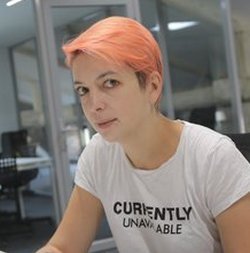5 questions about feminism in Tatarstan
What do feminists around the world where equal rights are spelled out for everybody fight against? And what do they do in our republic?
International Feminism Day is allegedly celebrated on 30 May. In fact, it is a fake that numerous Russian newspapers spread relying on Igor Guberman’s one verse. All English-speaking sources say that the only international day dedicated to the fight for women’s rights is on 8 March. However, Realnoe Vremya’s editorial decided anyway that even the fake international holiday is a good idea for asking five questions about feminism in our republic.
Is feminism for Tatar women a novelty?

“Tatar feminism has a historical background. It is both legendary characters of female warriors of the Volga Bulgaria era and the women’s involvement in the management of the Khanate of Kazan. For instance, Tsarina Syuyumbike has always been one of the bright folk symbols.
By the way, in Islam, the woman has extensive rights. This applies to both inheritance issues and family affairs. I have come across a lot of early 19th-century documents when Tatar women themselves divorced their husbands and stood up for their property and other rights through Sharia judges.
But Tatar women’s educational issues became topical in the 19th-20th centuries. And there is a very interesting moment here: Tatar feminism developed under men’s control. It would be impossible without their special attitude to this matter. Of course, we are talking about Tatar intellectuals who perfectly understood that educated mothers were necessary to develop the nation. This is why the expression “the mother of the nation” was popular in the Tatar press in the early 20th century. In other words, the following idea was voiced: “We invest in girls, we invest in the people’s future.”
By 1917, Tatar women were emancipated among Muslim women not only in Russia but also in the world. They studied, worked, did charity work and other socially useful activity. For instance, they were actively published in the Tatar press, there were writers, poets among them. It is no surprise that the All-Russian Congress of Muslim Women took place precisely in Kazan in April 1917. Mainly Tatar women participated in it. By the way, some issues discussed during the congress already transcended Muslim law. For instance, some Tatar activists were against polygamy.
Tatar feminism developed under men’s control. It would be impossible without their special attitude to this matter
Another reality came in the Soviet era. But Tatar women were employed in different spheres as early as the beginning of the post-revolutionary years. They worked as teachers, doctors, were responsible workers in administration and so on. All this was the fruit of pre-revolution female education. Tatar women turned out at the forefront of Soviet feminism. Of course, not all Tatar men liked these sudden transformations in society because the pre-revolutionary variant of Tatar feminism was anyway softer and was aimed at the woman’s self-fulfilment, first of all, in the family. While Soviet power made the woman a worker. This is why the people forcedly got accustomed to the new realities.
By the way, despite all this, I am not sure if today’s demonstrationы of feminism in Tatarstan have national or religious specifics.”
Laws have no discrimination against women, all have equal rights, what else do you want?

“I often hear my colleagues ironically make remarks about me. They say that as a lawyer I should know that we have equal rights, this is why it is completely unclear what rights we have still been fighting for. Meanwhile, as a lawyer, I perfectly understand that it is necessary to distinguish between the rights declared in regulatory acts and the opportunities for their realisation. I will put examples only from labour law.
For instance, any discrimination is prohibited by legislation when employing somebody. It is written in black and white in the Russian Labour Law that a candidate may not be denied employment on the grounds that aren’t related to his business and professional qualities. This means that if a candidate fits a vacant position in terms of work experience, knowledge, qualification, he or she may not be denied on the grounds of sex, age, religion and other external factors. In fact, we see a completely different picture.
Last year, hh.ru recruitment agency asked recruiters what requirements that have nothing to do with their professional qualities employers made for candidates. And gender was the most popular requirement. Interestingly, women were required for low-paid or ‘traditionally female’ specialities (for instance, as a babysitter or secretary). While being a man for a candidate is a compulsory requirement when looking for qualified, high-paid specialists — IT, engineers, C-suite.
It is noteworthy how employers explain these requirements. Today, in the 21st century, they say they look for a man because a woman is unable to do this job. While let’s say, a woman should be a babysitter because a man won’t work for such a small salary — because he has to maintain his family. By the way, the average salary gap between the man and woman on the same post in Russia was 27,9% last year. In other words, she is paid less by default — she is a woman. Therefore, as a rule, she is on maternity leave, which means since she anyway will be away, there is no point in paying her a lot. Do you see? A vicious circle.
And even the fact that according to the Labour Code, the woman has more labour rights plays against her, not in her favour. Look yourself: such a woman should be provided maternity leave if she is pregnant, she cannot be dismissed, a woman with little kids cannot be laid off, with children under 14 years she has a priority to stay during a lay-off. As a result, employers aren’t ready for a pile of these problems: in other equal conditions, they will hire a man because he doesn’t give birth to a child, doesn’t fall ill and he seemingly doesn’t have to take care of children.
As a lawyer, I perfectly understand that it is necessary to distinguish between the rights declared in regulatory acts and the opportunities for their realisation
All this must change, and feminism fights for it. Perhaps, men who are on paternity leave or employers who protect women’s rights should be encouraged. Perhaps, there is sense in introducing quotas for the number of women in a company’s top management. There must be a state policy that will stop encouraging the woman only to give birth, do the washing and cleaning but say: ‘The woman can do whatever!’ Because the foundation is laid in childhood, in general ideology. In handicrafts class at school, boys programme, girls make a salad. And what will we get in the end?
I will provide another interesting fact: among all the employees of companies in Russia, women account for 63% of qualified and educated workers, that’s to say, they are the majority. And when it comes to the top management, the amount of women is close to zero. The situation isn’t comforting in business: if only 20% of executives are women in small businesses, their number in the Russian top 200 companies with the biggest turnover is only 6,5%. Isn’t this discrimination? Shouldn’t we fight for this?”

“We fight for everything good and against everything bad. For instance, equal responsibility for babies is an important issue. The official debt of alimonies alone in our country is equal to 160 billion not because we have equality, right? We fight for equal rights, and yes, for equal obligations and equal responsibility.
I often hear an argument from men: why do courts give children to the woman in case of divorce? Isn’t this a violation of men’s rights? And it is an amazing argument. And it would be absolutely true if men tried hard to have custody of their children. Precedents say that more than 60% of requests when the man asks to give him a child are approved. In fact, we have only divorced women with children — the man simply doesn’t try to have custody of the child. It is convenient when his ex-wife brings up the child, while he rushes to build his life with his hands untied.
And this is just a drop in the ocean of those issues and problems feminism tries to solve in our country and republic. We are just at the beginning of the journey, but it is good the journey is at least beginning.”
What is done in Tatarstan in this respect and what have we managed to achieve? How does the feminist movement help women?

“FemGirls is a young group, we have been operating for just three years, but of course, feminists had existed in Tatarstan long before us. For me, the fact that people started to talk about it is the main sign of the development of ideas of feminism in Tatarstan and Russia in general. Attention can be both positive and not really, but most importantly, there is attention. Also, a lot of young women have realised in the last years they are feminists and have started to live differently getting rid of stereotypes step by step every day.
Feminism gives women the optics to see how the patriarchate limits us. Feminism helps to get rid of the hostility to other women, the directives that the woman cannot do something, the dissatisfaction with herself, the desire to be liked by everyone and be convenient. This is its huge liberating power.
While the question about real help sounds as if running a public community is an insufficient job. We aren’t a crisis centre, though we cooperate with it and re-refer victims there. We don’t save women — a bigger organisation is necessary for this. Our first task is to keep the life of the feminist community locally, the second task is to give instruments to those women who can save themselves on their own.
For me, the fact that people started to talk about it is the main sign of development of ideas of feminism in Tatarstan and in Russia in general
We run a community where we talk about the position of women in Tatarstan, Russia and the world. We organise educational and entertaining events — lectures, films, open mics for women. At times, we hold campaigns, deal with art a bit. We collect and publish useful legal information for women — what to do and where to go in a crisis or a simply unclear situation. We help women find female specialists — doctors, psychologists, car repairers, techies...”
Are feminists really against dresses and conventional womanliness?
Ksenia Lukicheva, a feminist, editor, media manager:
“Can a feminist look conventionally womanish? And a feminist in a dress is as natural as a feminist in jeans. Most importantly, she must feel comfortable. In my opinion, it is an absolutely obvious thing.
Feminism fights for leaving women in peace and letting them look like they want, not the way others order them.
If a girl doesn’t like dresses and high heels, our society imposes a thought on her that she is the wrong woman, broken and spoiled. While feminism says that you in general already look good. Neither a dress nor high heels make you a woman.
A feminist in a dress is as natural as a feminist in jeans. Most importantly, she must feel comfortable
And it is a very cool and useful acknowledgement for any of us that every woman already looks good, no matter how she wants to dress or brush her hair. While society’s pressure is enormous. All this ‘Wear high heels, be womanish, you look good precisely this way’... Over the last week, strangers have commented on my appearance twice. To start with, I have been said that tattoos are not for women. Interestingly, why do these people think that tattoos are for men? Does their skin look differently? After having my hair dyed, I heard: ‘Why do you need this outrageous behaviour? You are a woman!’ So we want saying this way to be improper and we want everybody to understand it.”
Why is the feminist agenda in Tatarstan aggressive and outrageous? Cannot feminists act more carefully?
Dina Nurm, a co-founder of FemGirls Kazan movement, linguist, designer, artist:
“The feminist agenda itself cannot be aggressive. The agenda is just a list of problems we draw attention to.
It is a violation of women: discrimination at work where women aren’t permitted to get into certain well-paid areas of activity and the top management; it is household chores, education of girls thinking about mandatory marriage, home economy and children, the beauty industry that lives because women are brought up in hate for their natural appearance.
Outrageous behaviour is a forced measure of those who are still devoid of voice. Think, mainly old men decide what women should do with their body even in the 21st century
We got accustomed to such an order of things so much that simply acting carefully, as you say, we won’t cause any feelings. Outrageous behaviour is a forced measure of those who are still devoid of voice. Think, mainly old men decide what women should do with their body even in the 21st century.
So feminists’ mythic aggression is just a reaction of patriarchal society to the unexpected loudness of women who “should be” modest.